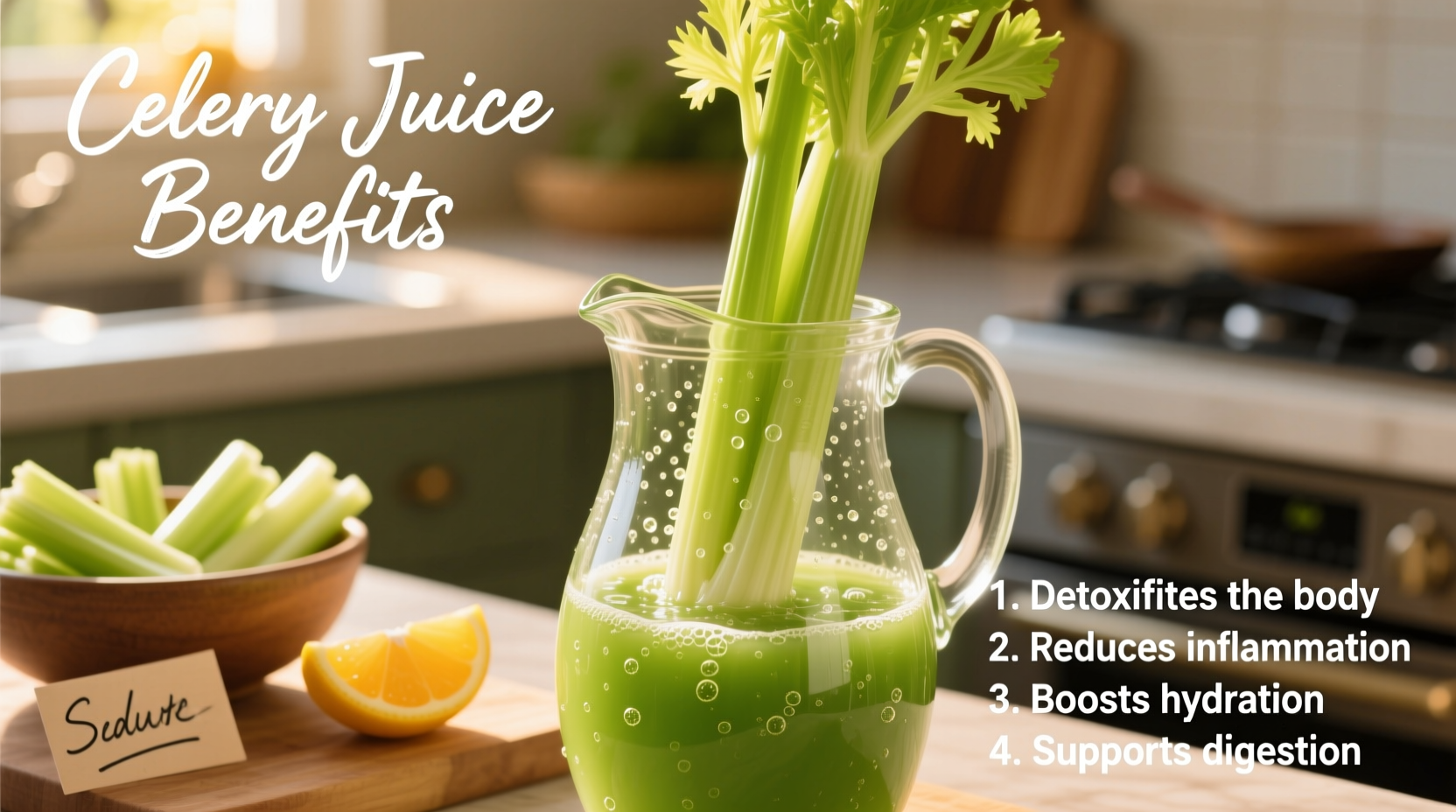Based on current scientific evidence, drinking celery juice provides hydration and delivers vitamins K and C, potassium, and antioxidants like apigenin. While popular claims about dramatic health benefits lack strong research support, celery juice can be a nutritious addition to a balanced diet when consumed as part of a varied plant-based eating pattern.
For years, celery juice has dominated wellness circles with bold promises of curing everything from inflammation to chronic disease. But what does the actual science say? As someone who's studied plant compounds and their effects on human health for over a decade, I've analyzed the research to separate evidence-based benefits from popular hype. This guide delivers what you need to know about celery juice—without the exaggerated claims.
What Science Actually Says About Celery Juice Benefits
Celery (Apium graveolens) contains several bioactive compounds that show promise in preliminary research. The most studied include:
- Apigenin - A flavonoid with demonstrated anti-inflammatory properties in laboratory studies
- Luteolin - Another flavonoid showing potential antioxidant effects
- Phthalides - Compounds that may support healthy blood pressure levels
According to the National Institutes of Health's research on dietary flavonoids, these compounds demonstrate biological activity in controlled settings. However, most studies use concentrated extracts rather than juice consumed in typical amounts. The NIH notes that "the bioavailability of dietary flavonoids is generally low," meaning your body may not absorb these compounds efficiently from juice alone.

Celery Juice Versus Whole Celery: Nutritional Comparison
| Nutrient | 8 oz Celery Juice | 1 Cup Chopped Celery (equivalent) |
|---|---|---|
| Calories | 40 | 16 |
| Dietary Fiber | 0.5g | 1.6g |
| Vitamin K | 30% DV | 37% DV |
| Potassium | 10% DV | 9% DV |
| Vitamin C | 5% DV | 6% DV |
Data sourced from USDA FoodData Central shows a key nutritional difference: juicing removes most dietary fiber. While both forms provide similar vitamins and minerals, whole celery delivers significantly more fiber—which supports digestive health and helps regulate blood sugar. This fact often gets overlooked in celery juice marketing.
Practical Guidelines for Consuming Celery Juice
If you're considering adding celery juice to your routine, these evidence-based recommendations will help you make informed choices:
Recommended Amount
Most research on celery compounds uses amounts equivalent to 8-16 ounces daily. The Mayo Clinic advises that vegetable juices can be part of a healthy diet but shouldn't replace whole vegetables entirely.
Best Time to Drink
Consuming celery juice on an empty stomach (typically first thing in the morning) may improve absorption of certain compounds. However, research on timing effects remains limited. For those with sensitive digestion, pairing it with other foods may prevent discomfort.
Preparation Tips
- Use organic celery when possible to minimize pesticide exposure
- Wash thoroughly—celery consistently appears on the Environmental Working Group's "Dirty Dozen" list
- Consume immediately after juicing to preserve nutrient content
- Consider adding a small amount of healthy fat (like avocado) to enhance absorption of fat-soluble compounds
Important Considerations and Limitations
While celery juice offers some nutritional benefits, it's crucial to understand its limitations and potential concerns:
Context Boundaries: Who Should Be Cautious
Certain individuals should consult healthcare providers before regularly consuming celery juice:
- People on blood thinners - Celery's vitamin K content may interact with medications like warfarin
- Those with kidney issues - High potassium content requires monitoring in kidney disease
- Individuals with celery allergies - Can cause severe reactions in sensitive individuals
- Pregnant women - Limited research on concentrated celery compounds during pregnancy
Separating Evidence from Hype
The celery juice trend gained momentum around 2017 through social media and wellness influencers. However, a 2022 review by the National Center for Complementary and Integrative Health concluded that "there is insufficient evidence to support most health claims made about celery juice." While preliminary research shows promise for certain compounds, these findings don't translate to dramatic health benefits from drinking juice alone.
Making Informed Choices About Celery Juice
Celery juice can be a refreshing way to increase vegetable intake, but it shouldn't replace whole vegetables in your diet. For optimal nutrition, consider these evidence-based approaches:
- Include both juiced and whole celery in your diet to benefit from fiber and nutrients
- Rotate celery juice with other vegetable juices for broader nutrient diversity
- Focus on overall dietary patterns rather than single "miracle" foods
- Consult registered dietitians for personalized nutrition advice
Remember that no single food or beverage can compensate for an otherwise poor diet. The most significant health benefits come from consistent, balanced eating patterns that include a variety of whole plant foods.











 浙公网安备
33010002000092号
浙公网安备
33010002000092号 浙B2-20120091-4
浙B2-20120091-4